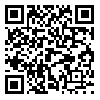Volume 20, Issue 80 (1-2012)
JGUMS 2012, 20(80): 49-59 |
Back to browse issues page
1- Guilan University of Medical Sciences , m_shahnazdoust@yahoo.com
2- Guilan University of Medical Sciences
2- Guilan University of Medical Sciences
Abstract: (8898 Views)
Abstract Introduction: Burnout is a specific kind of occupational stress reaction prevalent among human service professions such as nursing. It is characterized by feeling of emotional exhaustion, depersonalization and reduced personal accomplishment. Occupational support is a factor reducing stress in workplace. The purpose of this study was to examine the level of burnout and relationship between it and occupational support in nurses. Materials and Methods: In a descriptive study, 257 nurses were randomly selected through stratified sampling, and were classificated into eight medical educational hospitals in Rasht. Participants completed MBI (Maslach burnout inventory) and Spooner occupational support questionnaires. T test, chi square test, Fisher’s exact test and logistic regression were used to analyze the data. Results: Emotional exhaustion was low in %51.4 and it was moderate to high in %48.6, depersonalization was low in %94.2 and moderate to high in %5.8, reduced accomplishment was low in %33.9 and it was moderate to high in %66.1. Coworker support in most nurses (%82.9) was moderate to high and manager support in %73.6 of the nurses was moderate to high. There was a negative correlation between manager support and emotional exhaustion and a positive correlation between dialysis unit and depersonalization and a negative correlation between age and depersonalization. Conclusion: Findings indicate that nursing managers can increase organizational support and consequently prevent nursing burnout. In doing so, high level of nursing care and job satisfaction are achieved
Review Paper: Research |
Subject:
General
Received: 2013/11/6 | Accepted: 2014/04/13 | Published: 2014/04/13
Received: 2013/11/6 | Accepted: 2014/04/13 | Published: 2014/04/13
| Rights and permissions | |
 | This work is licensed under a Creative Commons Attribution-NonCommercial 4.0 International License. |


